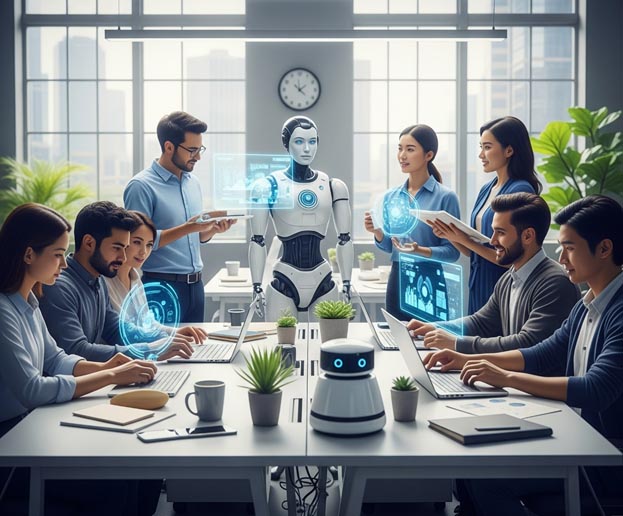AI in the Workplace: Friend or Foe for Your Career?
The buzz around Artificial Intelligence is everywhere. From automating routine tasks to generating creative content, AI's capabilities are expanding at an astonishing rate. This rapid evolution has sparked a fundamental question for professionals across every industry, including automation: Is AI a friend or a foe to my career?
The short answer? It’s both, but predominantly a powerful friend if you know how to leverage it.
Let's unpack the reality of AI's impact on your career, and how you can not just survive, but thrive in the AI era.
The "Foe" Narrative: Understanding the Concerns
It's natural to feel a pang of apprehension when headlines talk about AI "taking jobs." And yes, certain roles, particularly those involving highly repetitive, predictable, or data-entry-heavy tasks, are indeed vulnerable to automation. Think of:
- Routine Data Entry: AI can process vast amounts of data far faster and more accurately than humans.
- Basic Customer Service: Chatbots and AI-powered virtual assistants are already handling many initial customer inquiries.
- Repetitive Manufacturing Tasks: Advanced robotics and AI are streamlining production lines, reducing the need for manual labor in specific areas.
- Simple Content Generation: AI can draft basic reports, emails, or even marketing copy, impacting roles focused solely on these outputs.
The fear isn't entirely unfounded. The World Economic Forum's "Future of Jobs Report 2023" predicted that by 2027, 83 million jobs may be displaced by AI, though it also projects 69 million new jobs created. This signals a shift rather than outright elimination for most professions.

The "Friend" Narrative: AI as Your Most Powerful Ally
However, focusing solely on job displacement misses the bigger, more empowering picture. For the vast majority of professionals, AI isn't here to replace you; it's here to augment you. Think of AI as a sophisticated co-pilot, not a replacement driver.
Here's how AI is becoming an indispensable friend to your career:
1. Automating the Mundane, Freeing Up the Meaningful:
- AI excels at handling tedious, repetitive, and time-consuming tasks. Imagine financial analysts spending less time on data reconciliation and more on strategic insights, or marketing professionals automating report generation to focus on creative campaign development. This frees you up to engage in more strategic, creative, and human-centric work that AI cannot replicate.
2. Supercharging Productivity and Efficiency:
- AI tools can process and analyze vast datasets in seconds, generating insights that would take humans weeks. This means faster decision-making, optimized workflows, and a significant boost in overall productivity. You can achieve more in less time, making you a more valuable asset to your organization.
3. Enhancing Decision-Making with Data-Driven Insights:
- AI provides powerful analytical capabilities, surfacing patterns and predictions from complex data that might otherwise go unnoticed. From predictive maintenance in factories to identifying market trends, AI arms you with better information to make more informed and effective decisions. Human judgment, combined with AI's data processing, creates a formidable synergy.
4. Fueling Innovation and Creativity:
- Believe it or not, AI can be a catalyst for human creativity. Generative AI tools can brainstorm ideas, suggest different approaches, or even create initial drafts, helping you overcome creative blocks and explore possibilities far more rapidly. This allows you to focus on refining, adding nuance, and applying your unique human touch.
5. Personalized Learning and Skill Development:
- AI-powered learning platforms can tailor educational content and career paths to your specific needs, helping you identify skill gaps and offering personalized recommendations for upskilling. This makes continuous learning, essential in the AI era, more accessible and effective.
How to Make AI Your Career's Best Friend
The key to navigating the AI revolution isn't to fear it, but to embrace it strategically. Here's your playbook:
1. Become AI-Literate:
- You don't need to be an AI developer, but understanding the fundamentals of AI – what it can do, its limitations, and how to effectively interact with AI tools (like prompt engineering for generative AI) – is becoming non-negotiable.
2. Focus on Uniquely Human Skills:
- AI thrives on data and logic, but it lacks empathy, intuition, complex ethical reasoning, original creativity, and the ability to build genuine human relationships. Double down on skills like:
- Critical Thinking & Problem-Solving: Applying judgment to AI's outputs.
- Creativity & Innovation: Generating novel ideas and solutions.
- Emotional Intelligence: Understanding and managing human interactions.
- Complex Communication: Persuading, negotiating, and leading.
- Adaptability & Lifelong Learning: The willingness to constantly evolve.
3. Learn to Collaborate with AI:
- Think of AI as a teammate. How can you leverage AI tools to make your existing workflows more efficient? Can AI handle the repetitive tasks, allowing you to focus on the strategic ones? Experiment with AI tools relevant to your field.
4. Specialise and Diversify:
- Deepen your expertise in a niche where human insight remains paramount. Simultaneously, broaden your skill set to adapt to evolving roles. For automation professionals, this might mean understanding the ethical implications of autonomous systems or developing expertise in human-robot collaboration.
5. Embrace Continuous Learning:
- The skills in demand are shifting rapidly. Dedicate time to formal and informal learning. Online courses, industry certifications, workshops (like those offered by Automation Mesaverse!), and even active participation in professional communities can keep your skills sharp and relevant.
The Future is Collaborative
AI isn't coming to take your job; it's coming to transform it. For professionals across the globe, the future of work isn't about humans versus machines, but humans with machines. By understanding AI, embracing continuous learning, and focusing on our uniquely human strengths, we can ensure AI is not a foe, but the most powerful friend our careers have ever had.

